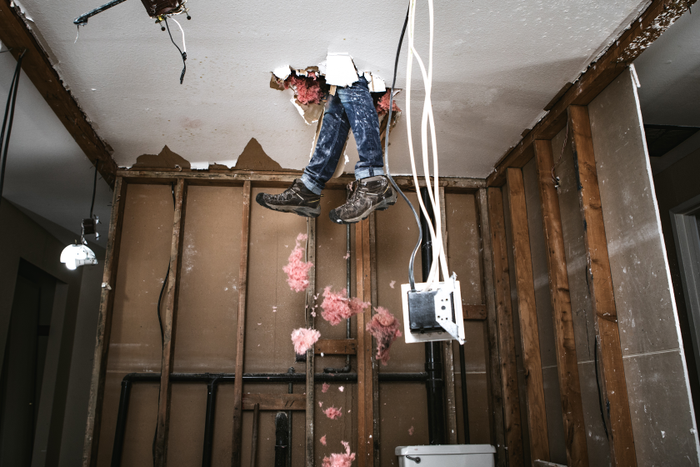What to include in your home improvement contract

So, you’ve planned your home improvement project. You’ve done the research, interviewed candidates, and found the general contractor you’d like to hire – the only thing left is to sign the papers and get to work. But here’s where you run into this sage advice: Get everything in writing.
Your home renovation contract is a big deal from this point on. This will be the shared starting point between you and your general contractor for the project. It will also be useful if any follow-up service or issues arise in the future. A detailed contract is your best resource for keeping timelines, budgets, responsibilities, and relationships on track.
The question is: What exactly do you need to get in writing?
Before you put ink to the page, here are 10 questions to answer when writing your home improvement contract:
1. What is the project scope?
Start by defining the scope of the project. This will ensure everyone understands what the project is aiming to achieve. End with a review of the scope to eliminate any confusion.
Make sure these elements are clearly defined. This way, everyone can understand the work being done, including you, general contractors, subcontractors, lawyers, and dispute resolution specialists.
Your project scope section in your contract should clearly define:
- What type of work (demo, install, finishing, removal, disposal)
- Materials needed (manufacturer, brand name)
- Subcontractors needed
- Completion date and/or targeted milestone dates for different project stages
- Budget expectations (this may not be binding, but a target budget should be identified)
- Design specifications with accompanying design drawings or blueprints, if applicable
2. What are the payment terms?
Never pay in full upfront. Stagger your payment schedule so your final payment isn’t due until the work is complete and you thoroughly inspect it. Do not pay cash; make sure your check is written to a company, not an individual, or use a credit card. Paying with a credit card will provide some recourse should the job not be completed, as stated in the contract.
To recap, these are the most important elements to include in the payment terms section:
- Total amount due
- Payment type – check or credit (no cash)
- Provisions for change orders (changes that may arise during construction, aka your emergency budget)
- Provisions for withholding payment if the work doesn’t match the agreed-upon scope or quality
3. What is the renovation schedule?
There’s nothing like having a deadline to keep expectations on track. After discussing the scope and projected labor with your general contractor, work together to identify how the following elements fit into the calendar:
Overall project timeline with the start and completion dates
Milestones: especially for larger projects like home additions, it may be beneficial to chunk out key milestone dates
Other deadlines (for permits, acquiring materials, project inspections)
Contingency timelines if work falls behind schedule
Penalties/incentives for early completion
4. What is included for insurance and liability?
Who’s on the hook for accidents like injuries or property damage? If you’re working with a trustworthy, BBB Accredited contractor, you may not be concerned. But do take the time to inquire about insurance and liability for your project, and make sure this language is outlined in the final renovation contract.
Insurance and liability details to be included:
Types and amount of insurance coverage required
Waivers of liability
Who is responsible for damages or losses that may occur during the project
5. Have you asked about a lien waver?
In the United States, a lien waiver is a statement from your contractor that says all suppliers and subcontractors have been paid for their work.
In some Canadian provinces, there is a mandatory Builders Lien holdback, so ensure you understand any financial obligations for which you may be liable.
6. What permits and approvals are needed?
Your contractor should have the correct permits before starting your project. They usually obtain the permits, but you will probably pay for them. Request that all final inspections be completed by the local building official prior to final payment.
Permit and approval information that should be detailed in your contract:
- Local authorities' permitting process, especially for new construction
- Provisions for obtaining the necessary permits and approvals
- Costs associated with this process
7. What provisions should be made for project terminations or disputes?
It’s not fun to think about before you’ve even started, but some projects can go south for a variety of reasons. Do not pay a contractor for poor work. This could mean stopping a project, debating if the contract was completed, or dropping the contract.
For your part, this creates a need to plan in advance by including the following provisions for a contract:
- Termination clause for failure to meet scope, schedule, payment, quality or expectations
- Termination clause for convenience
- Specifications on how disputes will be resolved (mediation/arbitration)
8. Are there any warranties, guarantees or future service agreements?
Ensure you know your warranty coverage and how to deal with service issues. Specify exactly what is expected of contractors. Explain how to address product defects. Outline acceptable timeframes for revisiting unfinished or unsatisfactory work.
This section should include language that addresses the following:
- Warranties and guarantees for all work performed
- Length of the warranty period
- What’s covered under warranty (labor, products, materials)
- Guarantees of work such as quality or performance
- Future service agreements
9. Do you have signatures from the homeowner and the contractor?
The name and contact information of the contractor and the homeowner should be included. Additionally, both parties should sign the document on the “dotted line.”
Both parties must sign and date all documents before work begins. Copies of the signed contracts should be given to everyone.
10. Have you requested a receipt?
Technically, this won’t be part of your contract, but make sure you request a receipt marked “Paid in Full” when the job is completed and your final payment made.
This will be another reference point to keep on file for legal and tax purposes.
Final thoughts: Keep your contract
Lastly, be sure to hold on to your contract for future reference. One of BBB’s Standards for Trust is to “Honor Promises.” This is, after all, a trusted document forged between you and your contractor.
If any questions arise after the work is complete, you want to ensure that every promise made is fulfilled.
Additional resources for your home improvement project:


